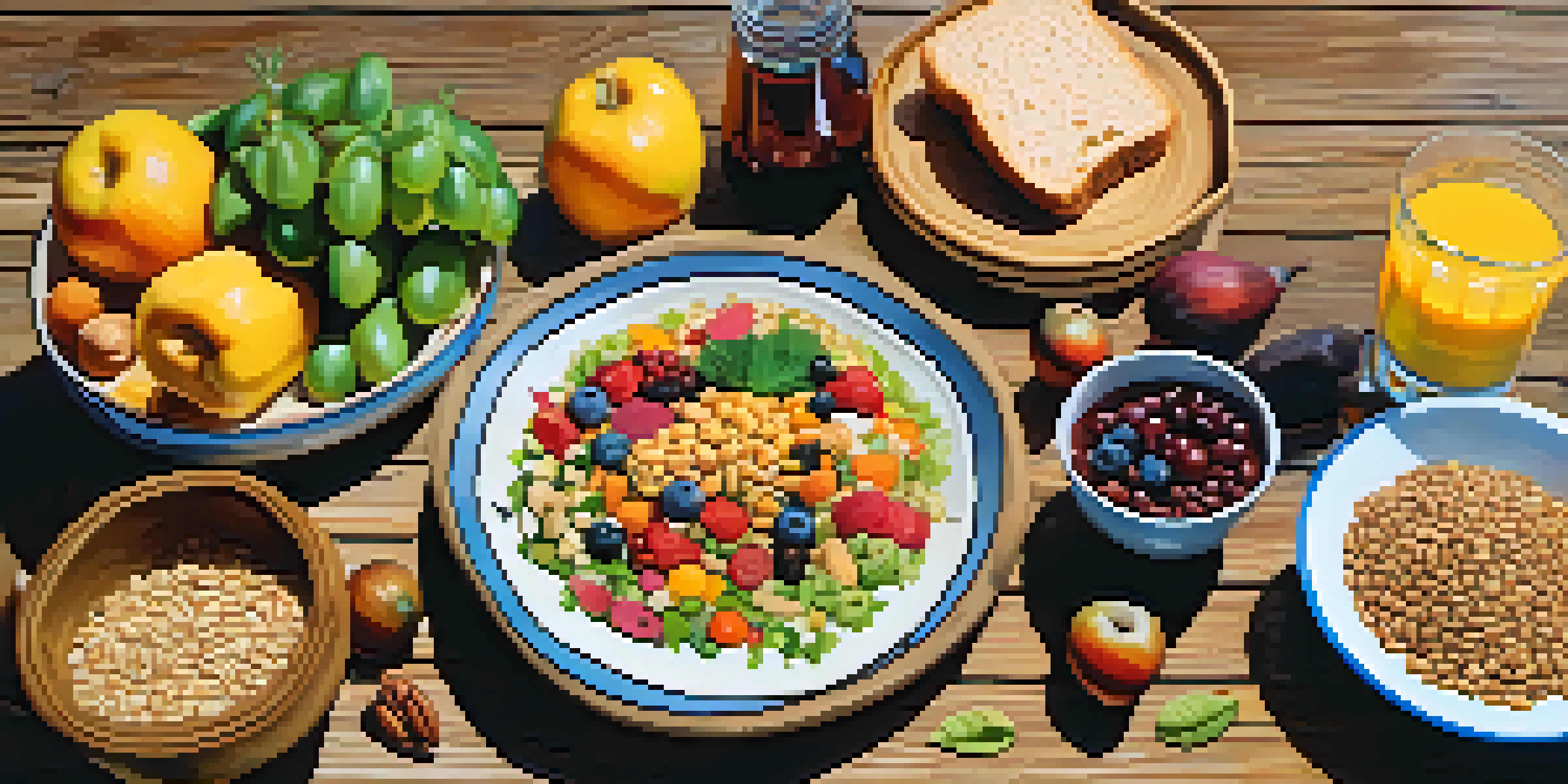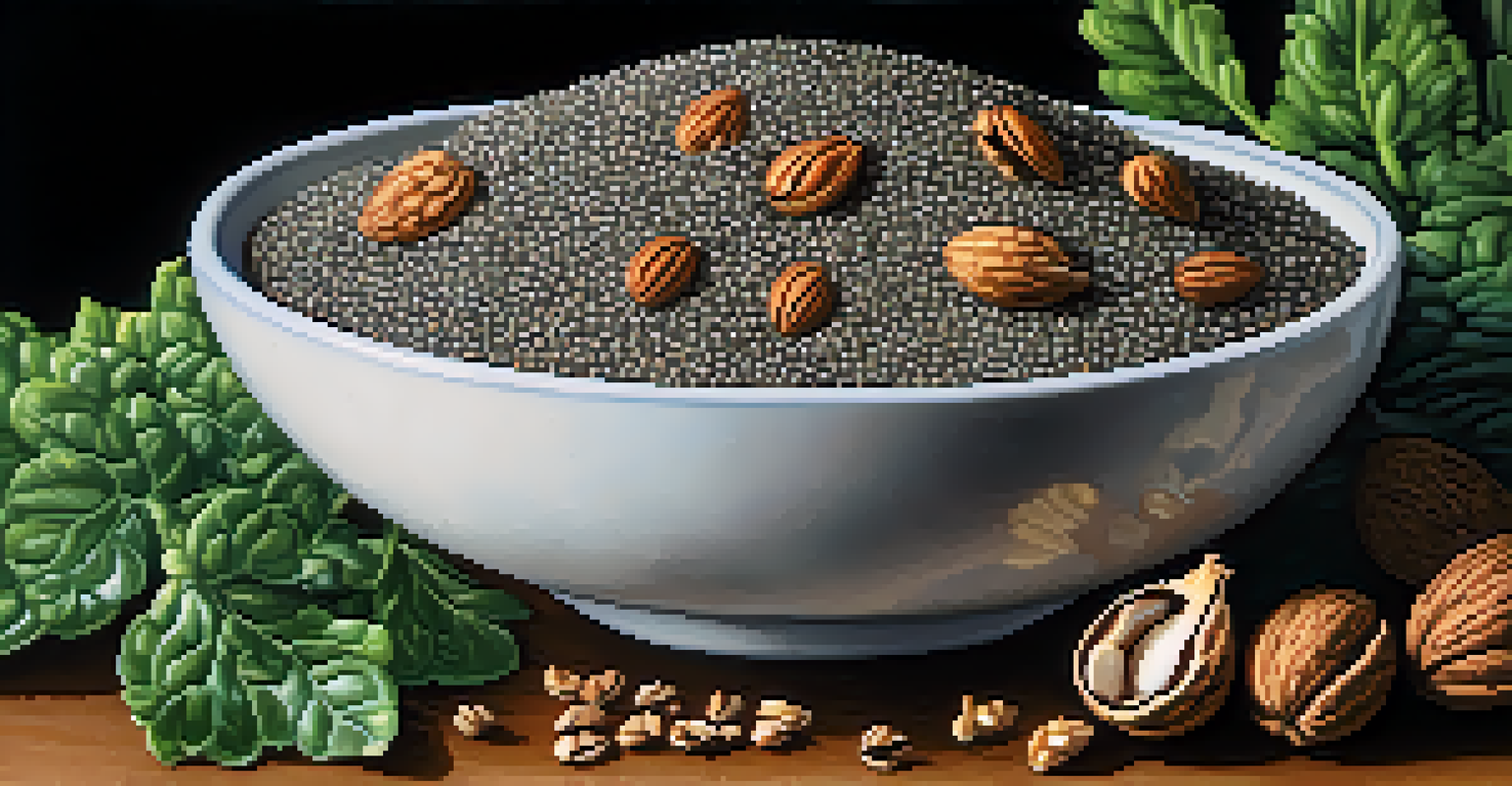Do Vegans Need to Take Supplements? Debunking Common Beliefs

Understanding Vegan Nutrition Basics
Vegan diets focus on plant-based foods, which can provide a wealth of nutrients. However, it's essential to ensure a balanced intake to meet all your dietary needs. Many people wonder if a vegan lifestyle can supply everything necessary for optimal health without supplements.
Let food be thy medicine and medicine be thy food.
Fruits, vegetables, whole grains, legumes, nuts, and seeds are staples in vegan diets, and they offer a variety of vitamins and minerals. Yet, some nutrients are harder to obtain from plants alone, leading to the question of supplementation. Understanding what these nutrients are is crucial for anyone considering a vegan lifestyle.
Overall, a well-planned vegan diet can be incredibly healthy, but it requires some knowledge and effort to ensure you're getting everything your body needs. Let’s delve deeper into why certain nutrients might need additional attention.
Common Nutrient Deficiencies in Vegan Diets
While a vegan diet can be rich in many nutrients, there are a few that vegans might find challenging to get in adequate amounts. Vitamin B12 is one of the most commonly discussed nutrients; it’s primarily found in animal products. This vitamin is crucial for nerve function and the production of DNA and red blood cells.

Another nutrient to watch for is iron, which comes in two forms: heme and non-heme. Heme iron, found in animal products, is absorbed more efficiently by the body. Vegans can still get iron, but they should focus on non-heme sources and pair them with vitamin C-rich foods to enhance absorption.
Key Nutrients for Vegans
Vegans need to pay special attention to nutrients like Vitamin B12, iron, and omega-3 fatty acids, which can be challenging to obtain from a strictly plant-based diet.
Additionally, omega-3 fatty acids, which are vital for heart and brain health, can be scarce in vegan diets. While flaxseeds and walnuts provide ALA (a type of omega-3), the conversion to EPA and DHA (the most beneficial forms) is limited in the body. Understanding these potential deficiencies helps vegans make informed dietary choices.
The Role of Vitamin B12 in a Vegan Diet
Vitamin B12 is often referred to as the 'vegan's dilemma' because it is predominantly found in animal products. Lack of B12 can lead to serious health issues, including anemia and neurological problems. Therefore, it's crucial for vegans to either consume fortified foods or take a B12 supplement regularly.
You are what you eat, so don't be fast, cheap, easy, or fake.
Fortified foods, such as plant-based milks, breakfast cereals, and nutritional yeast, can be great sources of B12. However, relying solely on these may not always be sufficient for everyone. A blood test can help determine if you're meeting your B12 needs or if supplementation is necessary.
Incorporating B12 into your diet is not just about avoiding deficiencies; it's about maintaining overall health and vitality. With the right approach, vegans can easily manage their B12 levels and enjoy the benefits of a plant-based lifestyle.
Iron Sources and How to Maximize Absorption
Iron is essential for transporting oxygen in the blood, and while it can be found in plant sources like lentils, beans, and spinach, the absorption rate is lower compared to animal sources. To maximize iron absorption, vegans can pair iron-rich foods with vitamin C-rich options, such as citrus fruits or bell peppers. This synergy can significantly boost the amount of iron your body can utilize.
Cooking methods also play a role; for example, cooking in cast iron pans can increase the iron content of food. Additionally, avoiding certain beverages like tea and coffee during meals can help as they contain polyphenols that inhibit iron absorption. Understanding these strategies can empower vegans to enhance their iron intake effectively.
Importance of Supplementation
Some individuals may require supplements to address dietary gaps, especially those with specific health needs or life stages, such as pregnancy.
Incorporating a variety of iron sources and being mindful of absorption techniques can go a long way in maintaining healthy iron levels. This approach not only supports energy levels but also overall well-being.
Omega-3 Fatty Acids: Plant-Based Sources Explained
Omega-3 fatty acids are crucial for heart and brain health, but many people mistakenly believe that only fish provide these essential fats. Vegans can obtain omega-3s from sources like flaxseeds, chia seeds, and walnuts. However, these foods primarily contain ALA, which the body must convert to EPA and DHA, the more beneficial forms.
The conversion rate from ALA to EPA and DHA is relatively low, which is why some experts recommend algae-based supplements for vegans. Algal oil is derived from algae and contains both EPA and DHA, making it a fantastic alternative for those who don’t consume fish. This option is not only effective but also aligns perfectly with a plant-based lifestyle.
Including a variety of these plant-based omega-3 sources in your diet can help support heart health and cognitive function. By being proactive about omega-3 intake, vegans can enjoy the benefits without compromising their dietary choices.
Calcium: Finding Alternatives to Dairy
Calcium is another nutrient that people often associate with dairy products, leading to concerns about its availability in vegan diets. Fortunately, there are many plant-based sources of calcium, including fortified plant milks, tofu, almonds, and leafy greens like kale and broccoli. This variety ensures that vegans can meet their calcium needs without relying on dairy.
Moreover, it's essential to consider factors that affect calcium absorption. For example, certain oxalate-rich foods like spinach can inhibit calcium absorption, while vitamin D plays a critical role in calcium utilization. Ensuring adequate vitamin D levels, whether through sunlight exposure or supplementation, can enhance calcium absorption significantly.
Maximizing Nutrient Absorption
Pairing certain foods, like iron-rich options with vitamin C, can significantly enhance nutrient absorption, contributing to better overall health.
By exploring diverse sources of calcium and being mindful of absorption factors, vegans can maintain strong bones and overall health. With thoughtful planning, getting enough calcium in a vegan diet is entirely achievable.
When to Consider Supplementation
While many nutrients can be obtained through a well-rounded vegan diet, some individuals may still require supplements to fill dietary gaps. Factors such as age, health conditions, and lifestyle choices play a crucial role in determining whether supplementation is necessary. For example, pregnant or breastfeeding women may need additional nutrients like iron and B12.
Consulting with a healthcare professional can help identify specific needs based on individual health profiles. Regular blood tests can also guide whether you are meeting your nutritional needs or if you should consider adding supplements to your routine. This proactive approach can help prevent deficiencies and promote overall well-being.

Ultimately, the decision to supplement should be based on personal health goals and dietary habits. With the right guidance, vegans can navigate their nutritional needs effectively and maintain a vibrant, healthy lifestyle.